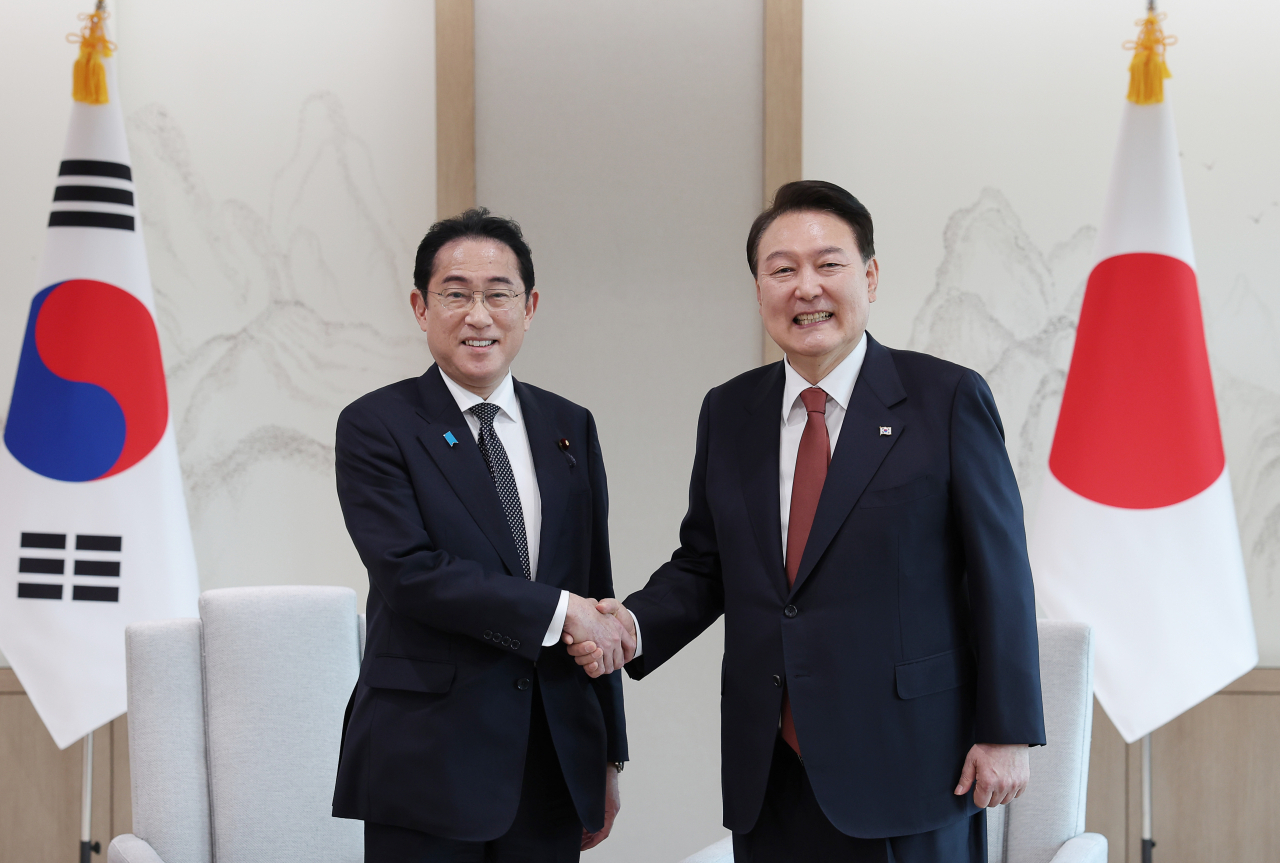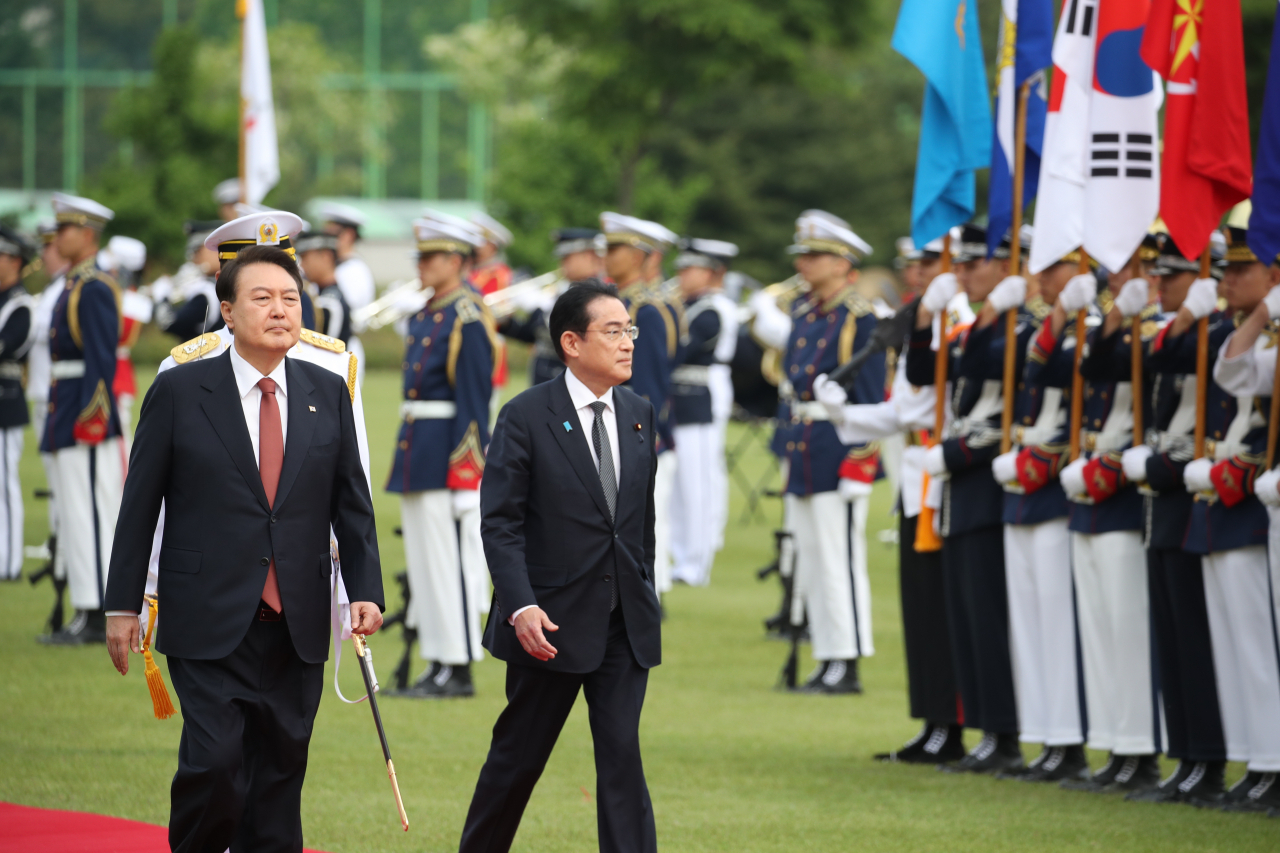Yoon, Kishida agree on Korean inspection of Fukushima wastewater
Yoon says Korea open to Japan's participation on Washington Declaration
By Shin Ji-hyePublished : May 7, 2023 - 19:55

Leaders of South Korea and Japan agreed to elevate bilateral ties to a higher level at a summit held in Seoul Sunday, both touting that the restored "shuttle diplomacy" has brought yearslong strained relations back on track.
At the summit, the second in less than two months, the two leaders agreed to allow a group of Korean experts to visit Japan to inspect the safety of contaminated water to be discharged from Fukushima nuclear reactors.
“I hope that meaningful measures will be taken in consideration of the people's demand for objective verification based on science,” South Korean President Yoon Suk Yeol said at the joint conference held after the summit.
While addressing the need to strengthen joint efforts to deter North Korea's evolving missile threats, as well as the rapidly changing geopolitical landscape, Yoon said he does not rule out Japan's future participation in consultations made as part of the Washington Declaration, under which Seoul and Washington will work together on extended deterrence.
“The South Korea-US Washington Declaration has not been completed, but is being discussed, and we are in a position to fill in the contents in the process of joint planning and joint execution,” Yoon said.
At the April 26 summit in Washington, Yoon and US President Joe Biden agreed to strengthen extended deterrence through the declaration, which includes the launch of a nuclear consultation group that ensures South Korea's participation in the process of providing extended deterrence by the US. The three-way summit was widely expected to forge strengthened cooperation from the three countries to deter North Korean threats as well as other challenges in the Indo-Pacific region.

The summit represents a return after more than a decade's hiatus of “shuttle diplomacy,” under which regular summits between the leaders are held, with the venue alternating between the two countries.
It was held with a shared goal to move forward for global peace and prosperity, according to the leaders.
On historic disputes which had long been hurdles for the two mending ties, Japanese Prime Minister Fumio Kishida said his "heart aches" for Koreans over colonial-era history but he feels grave responsibility to move forward by carrying on “the efforts of the ancestors who have overcome difficult times.”
During the opening speech at the expanded summit, Yoon also said that since the summit in Tokyo less than two months ago, the relations between South Korea and Japan have clearly improved. He also expressed a sense of responsibility to create even better times beyond the good times in the past.
"We need to move away from the perception that we can only move forward once all historical issues have been resolved,” he said.
On the economic front, Yoon said he has agreed with his Japanese counterpart to expand flight routes to pre-COVID 19 levels, stressing the need to promote people-to-people exchanges.
Kishida arrived in Seoul for a two-day working visit, less than two months after the March summit in Tokyo. He was the first Japanese leader to make a bilateral visit to Korea in 12 years after former Prime Minister Yoshihiko Noda, amid warming bilateral ties after Yoon's visit to Tokyo, also the first by a South Korean leader in 12 years.

The Japanese premier kicked off his Seoul visit by heading to Seoul National Cemetery to pay his respects to Korea's fallen independence fighters and war veterans.
Kishida, along with his wife, first lady Yuko Kishida, Deputy Chief Cabinet Secretary Seiji Kihara, Japanese Ambassador to Korea Koichi Aiboshi and Korean Ambassador to Japan Yun Duk-min paid their respects to Korean martyrs in a solemn atmosphere.
On his trip to the national cemetery where independence activists who fought against the Japanese colonization are buried, a Japanese government official said it is part of customary engagements for a Japanese leader when visiting a foreign country, playing down its significance.
"It's a natural thing for the head of a country to visit a (country's) memorial place ... and express respect for the lives of many people related to the country's history," the official was quoted as saying by a Tokyo correspondent from Yonhap News Agency.
"Prime Minister Kishida also wants to pay his respects to the people who are a part of Korean history," the official added.
Kishida then met with members of the Seoul Japan Club, a Japanese business community in Seoul, before he headed to the presidential office for the summit later in the afternoon.
Kishida's reciprocal visit to Korea came ahead of a trilateral summit expected to take place among leaders of the US, Japan and South Korea, on the sidelines of the Group of Seven summit in Hiroshima this month.
After the joint press conference, the heads of both countries moved to the Hannam-dong residence and had dinner together.
On Monday, Kishida is scheduled to meet with members of the Japan-Korea Parliamentarians' Union and Korean businesspeople before leaving for Tokyo.




















